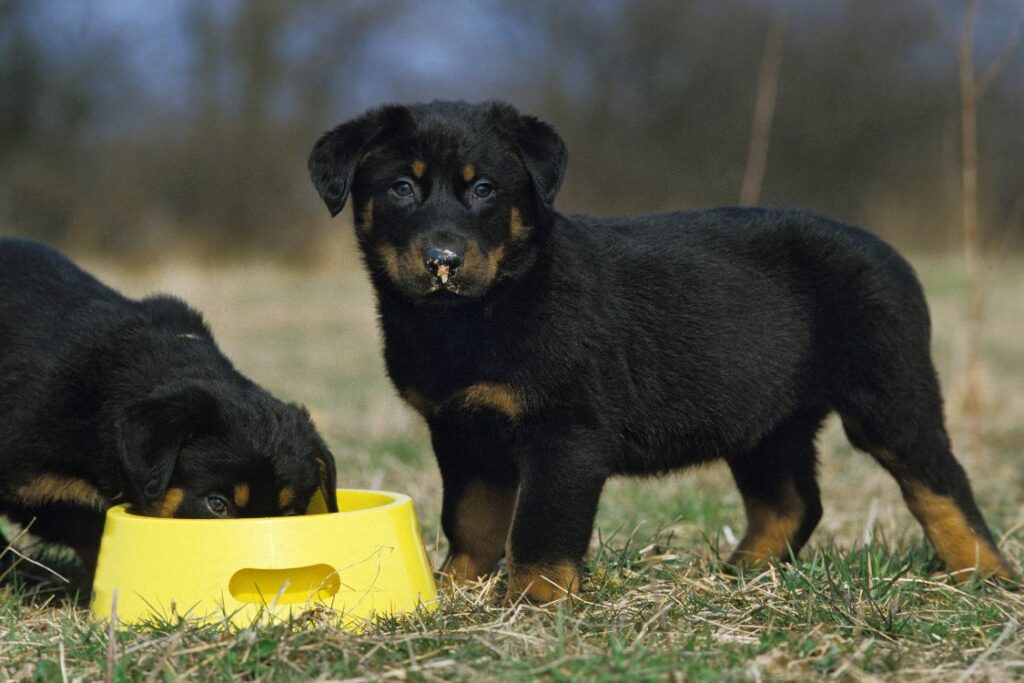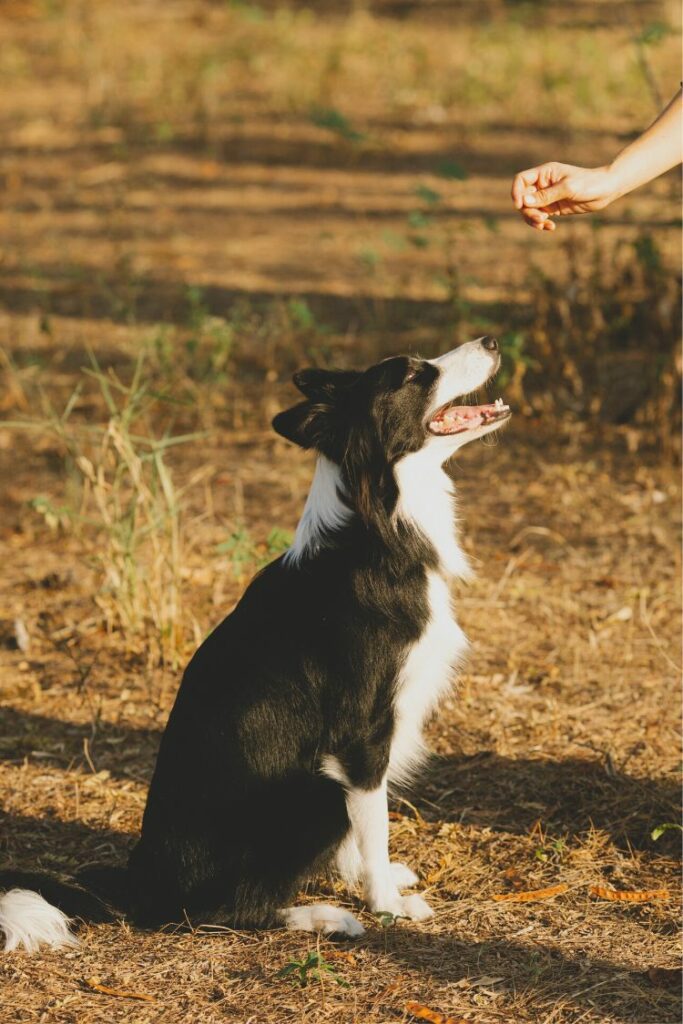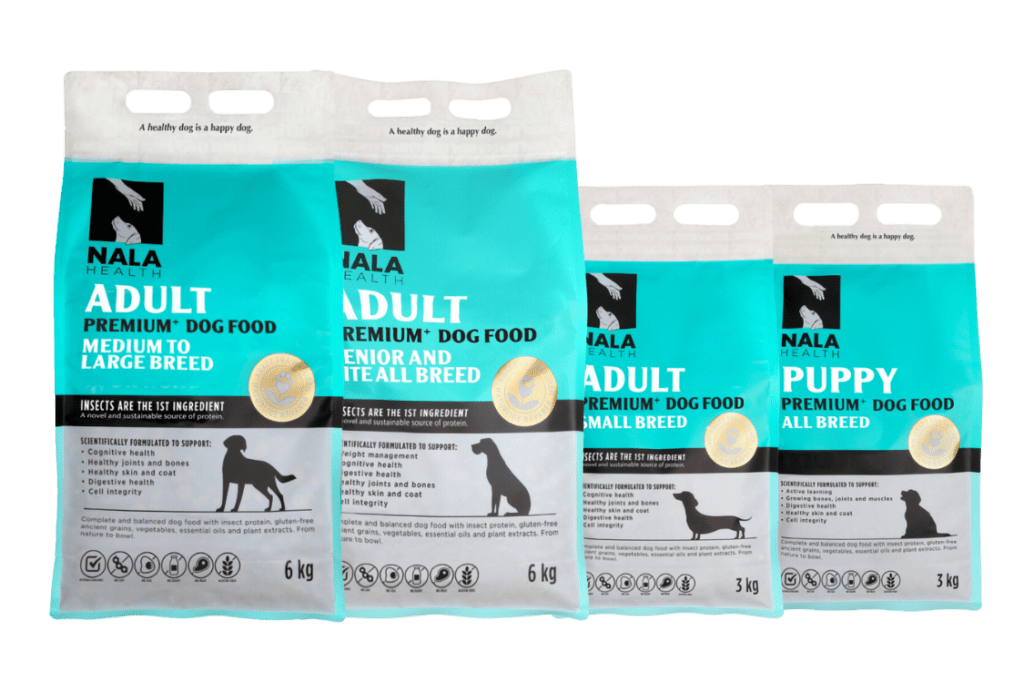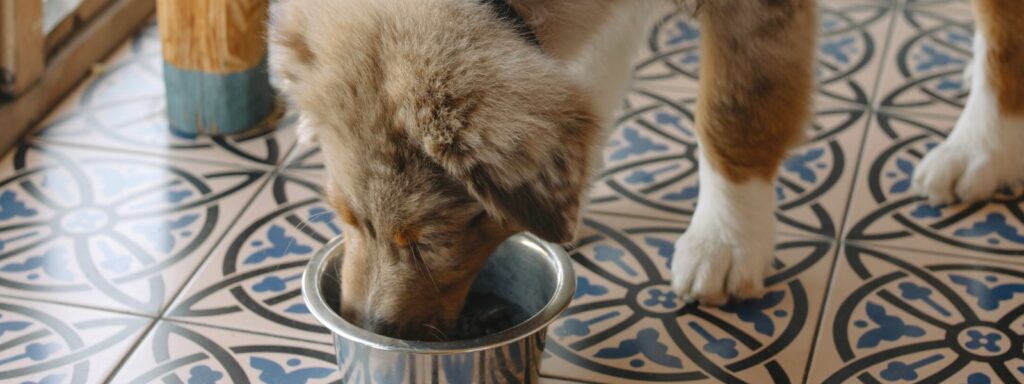What is the best dog food?
 Cecilie Hemsen Berg
Cecilie Hemsen Berg
Choosing the right food for your dog is one of the most impactful decisions you can make for their health, happiness, and longevity. Research shows that 75% of health is influenced by lifestyle, with diet being a key factor. A balanced diet provides the nutrients dogs need for growth, repair, energy, and overall well-being. Proper nutrition helps prevent lifestyle diseases like obesity, diabetes, and heart issues while reducing the risk of malnutrition. An optimal diet ensures your furry friend thrives at every life stage, from playful puppyhood to their golden years. With so many options available, it can be overwhelming to decide what’s best. This guide will help you understand what makes dog food exceptional and how to choose the best option for your pet whether you choose dry food, wet food or a combination of these.
At Nala Health, we take a holistic approach to nutrition, carefully balancing high-quality ingredients to provide the right mix of proteins, fats, and carbohydrates. Our food is enriched with essential vitamins, minerals, and trace elements to support overall health. To promote optimal nutrient absorption and digestive health, we also include probiotics and beneficial fibre, ensuring your dog thrives from the inside out.

What Makes Dog Food “The Best”?
The best dog food provides a complete, balanced easy digestible diet tailored to your pet’s unique needs. Read the ingredients list and make sure the food does not contain sugar, sweeteners, artificial colour and flavour, fillers (like “modified corn starch”), derivatives or harmful preservatives. Opt for dog foods preserved with natural alternatives like mixed tocopherols (Vitamin E), Vitamin C, or rosemary extract for a safer option. High-quality food should include:
1. Protein
Protein is essential for muscle development, energy, and repair. It should come from clean, high-quality and digestible sources like black soldier fly larvae, game, wild-caught fish or free-range sources. Factory-farmed animals are often raised on low-quality feed and may be given antibiotics and growth hormones to promote rapid growth and prevent disease. Dog food containing meat meal and animal by-products can be problematic, as it may include a mix of ingredients like chicken, beef, and organ meats, which can trigger allergies in sensitive dogs. The rendering process used to produce meat meal involves high heat, which can reduce protein quality by destroying some amino acids. For optimal nutrition, look for dog food with clearly identified protein from trusted sources.
Amino acids are the building blocks of protein and play a vital role in many bodily functions. Some premium dog foods opt to include extra amino acids for their added benefits. For example, tryptophan can be beneficial for mood and mental health and useful for dogs battling with anxiety. Taurine, L-Carnitine are particularly important for heart health and fat metabolism, helping to maintain your dog’s cardiovascular system and energy levels. Including these essential amino acids ensures your dog gets targeted nutritional support for optimal health.
2. Healthy Fats
Fat is the primary source of energy for dogs and plays a crucial role in their overall health. It helps the body absorb important vitamins like A, D, E, and K, which are essential for various bodily functions. The best dog food includes healthy fats, including essential fatty acids like omega-3 and omega-6. These fatty acids support brain function, the nervous system, eyes, joints, skin, coat, and a strong immune system. Omega-3, in particular, can help reduce inflammation and alleviate allergies.
Great sources of healthy fats include wild-caught fatty fish such as sardines and mackerel, fish oil, black soldier fly larvae, marine algae, green-lipped mussels, whole eggs, flaxseed oil, coconut oil, cold-pressed canola oil, and olive oil. Canola oil and coconut oil are naturally stable as they contain vit E (acts like an antioxidant).

3. Complex Carbohydrates
Complex carbohydrates like millet, sorghum, oats, quinoa, and barley provide energy while offering useful nutrients like plant protein, fibre, antioxidants and small amounts of healthy fats. Low GI, gluten-free ancient grains such as millet, sorghum and oats are also gentle on digestion, making them excellent alternatives. Additionally, millet and sorghum are more sustainable, requiring fewer resources to produce compared to common crops like soy, corn, rice or wheat. Soya, wheat and corn can also cause allergic reactions.
4. Vitamins and Minerals
Dogs need water-soluble vitamins B and C, fat-soluble vitamins A, D, E and K, as well as minerals and trace elements such as calcium, phosphorus, magnesium, sodium, potassium, chloride, copper, zinc, iodine, chromium, manganese and selenium. These are all needed every day in correct amounts to stay healthy, and commercial dog food has to follow recommendations from the state vet to ensure a balanced inclusion.
5. Antioxidants
Antioxidants act like shields for your dog’s cells, protecting them from damage caused by harmful molecules called free radicals. They also help reduce oxidative stress, which can harm your dog’s health over time. You can find antioxidants in colourful vegetables, fruits, berries and certain herbs. For example, carrots, sweet potatoes, and watermelon are packed with powerful nutrients like beta-carotene, lutein and lycopene. Herbs such as turmeric, rosemary, and even cinnamon also provide natural antioxidant benefits, helping to keep your dog healthy and strong.
Signs Your Dog Is Thriving on Good Nutrition
When your dog is eating high-quality food, you’ll notice several positive physical and mental changes:

- Healthy stools: Firm and consistent.
- Shiny, soft coat: Your dog looks and smells great.
- Clear eyes: Bright with no irritation.
- Fresh breath: Healthy gums and teeth.
- Consistent weight: Lean and steady body mass.
- Good energy levels: Your dog is active and content.
If your dog experiences issues like dull fur, recurring infections, itchy skin, or poor energy, it might indicate an allergy, sensitivity, or a lack of key nutrients. Consult your vet and review your dog’s diet for improvements. You can read our blog “8 signs of a healthy dog”.
Premium vs economic Dog Food
The difference between premium and budget-friendly dog food lies in the quality of ingredients. While economic brands meet minimum nutritional standards, premium food often provides superior benefits in gut health, cellular protection, and overall vitality. High-quality ingredients are more digestible and bioavailable, meaning your dog absorbs more nutrients. This is why Nala Health prioritizes premium, sustainable ingredients to deliver optimal health benefits.
The Role of Protein in Your Dog’s Diet
Protein is made up of amino acids, which are found in meat, fish, edible insects, eggs and plants. Dogs need 10 essential amino acids in each meal to make a complete protein. High-quality proteins are easily absorbed by the body (bioavailable). Good sources of protein are black soldier fly larvae, venison, ostrich, rabbit, duck, wild-caught fish and free-range chicken to mention a few. Plant protein sources are for example lentils, chickpeas and peas. The protein source should be clearly named and listed on the ingredient label, making it easy to select a food that suits your dog’s specific needs. High-protein diets are not suitable for all dogs and should be tailored to individual needs based on factors like age, activity level, health status, and breed. Pure meat diets does not contain fibre.

Insect Protein
Edible insects like black soldier fly larvae (BSFL) are a powerhouse of nutrition and an environmentally friendly protein source. They require significantly less water, food, and land to produce compared to traditional livestock, making them a sustainable choice. Extensive research has highlighted their impressive nutritional profile and health benefits for both animals and humans. For dogs, BSFL provides complete protein along with healthy fats, essential minerals, and fibre.
At Nala Health, we use BSFL sourced from an EU-certified farm in Cape Town. This protein is clean, traceable, and highly consistent in quality. The larvae are fed on leftover grain mash from beer brewing, ensuring a sustainable and eco-conscious process. No antibiotics or growth hormones are used, keeping the protein clean and as natural as possible.
BSFL is an innovative addition to dog food, especially beneficial for dogs with allergies or food sensitivities. It’s easily digestible and boasts a rich umami flavor, similar to bone broth, that dogs love. With BSFL, you’re providing your dog with top-tier nutrition while also supporting a healthier planet.
Offal as a Protein Source
High-quality, organic organ meats can be a nutritious addition to a dog’s diet for those not sensitive to high purine levels, such as Dalmatians. While purines are naturally present in most foods, they are particularly abundant in red meat, fish, seafood, and organ meats. For some dogs, excessive purine intake can lead to the formation of urinary crystals or stones.

Dogs with kidney issues or certain other health conditions may need to avoid high-protein diets. When it comes to nutrition, quality always outweighs quantity—providing your dog with the right balance of nutrients is key to supporting their health and well-being.
Animal By-Products
Animal by-products are parts of a slaughtered animal that are not fit for human consumption. The vast majority of this material undergoes a process called rendering, which might not provide the best quality. Regulations for meat and fish production, the use of antibiotics and growth hormones and the composition of meat meal and animal by-products can differ from country to country. No meal will ever be better quality than the meat it was sourced from, and the nutritional content and quality of protein depends on what the animal or insect eats, and its lifestyle.
Shining a Light on Gut Health
The digestive system is central to your dog’s overall health from their digestion to their immune system and mental well being. Your dog will therefore benefit from dog food that contains ingredients that promote a balanced gut microbiome:
- Probiotics: For a healthy microbiome.
- Prebiotics/fibre: Prevent constipation, promote regularity, and feed the good gut bacteria.
- Butyrate: Short chain fatty acid that support the gut lining.
At Nala Health, our recipes are enriched with probiotics, prebiotics and butyrate to maintain a balanced gut microbiom.
Nutrition for Every Life Stage
The best food for your dog will also be tailored to their lifestyle. Dogs need different blends of nutrients from puppyhood to their senior years.
Puppy
Puppy food contains more calories, protein and fat than food for adult dogs, in addition to an optimal combination of vitamins and minerals to ensure healthy development of tissues and active learning; DHA omega 3 is important for the development of the brain, heart and eyes, and a balanced inclusion of calcium and phosphorus are important for healthy development for bones and joints.

Adult
Large and small dogs have varying nutritional needs, including calorie levels and nutritional density. Large dogs benefit from a diet that supports joint health. Small breeds need more concentrated levels of nutrients because they eat small portions.
Senior dogs
Seniors (age 7+) need more rest and recuperation, and their level of activity gradually decreases. They need fewer calories, less fat and protein while maintaining the total nutritional content. Less activity can contribute to slower digestion and constipation, which fibre and probiotics can help with. Nala Health senior dog food contains, among other things, L-carnitine, Taurine, choline and marine omega 3 to support cognitive health, heart health and fat metabolism.
Pregnant and lactating dogs
Pregnant and nursing dogs require additional calories and nutrients to support both their own well-being and the healthy development of their puppies. Puppy food is an excellent choice, providing the enhanced nutrition she needs during this critical time. To help her stay healthy, offer small, frequent meals throughout the day and schedule regular check-ups with your veterinarian to monitor her weight and overall condition. This ensures she gains weight at a healthy rate and remains in optimal health while caring for her puppies.
Nala Health has developed 4 complete diets based on science for puppies, small dogs, medium to large dogs and seniors (also beneficial for weight management).

Combination/Hybrid Diets
Dogs often enjoy variety in both flavors and textures, and a combination diet can add excitement to their meals. As long as the foundation of their diet is nutritionally balanced and high-quality, you can safely mix in extras like steamed vegetables, fruits, berries, eggs, small portions of clean meat or fish, high-quality wet food, or bone broth. The key is moderation—avoid overfeeding or underfeeding to maintain your dog’s ideal weight and health.
When introducing new ingredients, it’s best to do so one at a time. This allows you to identify any potential adverse reactions and adjust accordingly. If you’re transitioning your dog to a new type of food, gradually mix the old and new diets over a week or more to minimize digestive upset. You can get some ideas for healthy food toppers in our blog here. You can also find a list of food your dog should avoid here.
Hygiene and Food Safety
Keeping a hygienic feeding environment for your dog is essential to ensure they steer clear from harmful bacteria and parasites that may infest food and water bowls. Hygiene is especially important if you are feeding raw food. To ensure your dog’s safety:

- Clean their food and water bowls daily.
- Store food properly to avoid contamination. The best is to store food in its original packaging. If you use a food bin, place the whole bag into the bin, rather than decanting the food.
- Choose dog food made in facilities with strict safety standards.
Nala Health food is steam-cooked in EU-certified facilities and undergoes rigorous safety checks. Our recyclable packaging preserves freshness while being eco-conscious.
Conclusion
Great nutrition is the foundation of a long, happy life for your dog. By choosing high-quality food like Nala Health, you’re not only supporting your dog’s health but also contributing to a healthier planet. Ready to make the switch? Explore our range and see the difference premium dog food can make.

